Ethics in Media Reporting: A Case Study on Malaysia
VerifiedAdded on 2019/10/31
|9
|3483
|291
Report
AI Summary
According to bin Ahmad Sabri (2012), Malaysian newspaper 'The Star' faced criticism for its coverage of religion, specifically Islam, during the month of Ramadan. The coverage was deemed problematic due to the country's multi-ethnic and multi-religious nature. The media's job is to serve the people and be sensitive to their beliefs. However, 'The Star' constructed a narrative associating Islam with terrorism, which can shape public opinion. As a result, the newspaper issued an apology and sacked two of its editors.
Contribute Materials
Your contribution can guide someone’s learning journey. Share your
documents today.
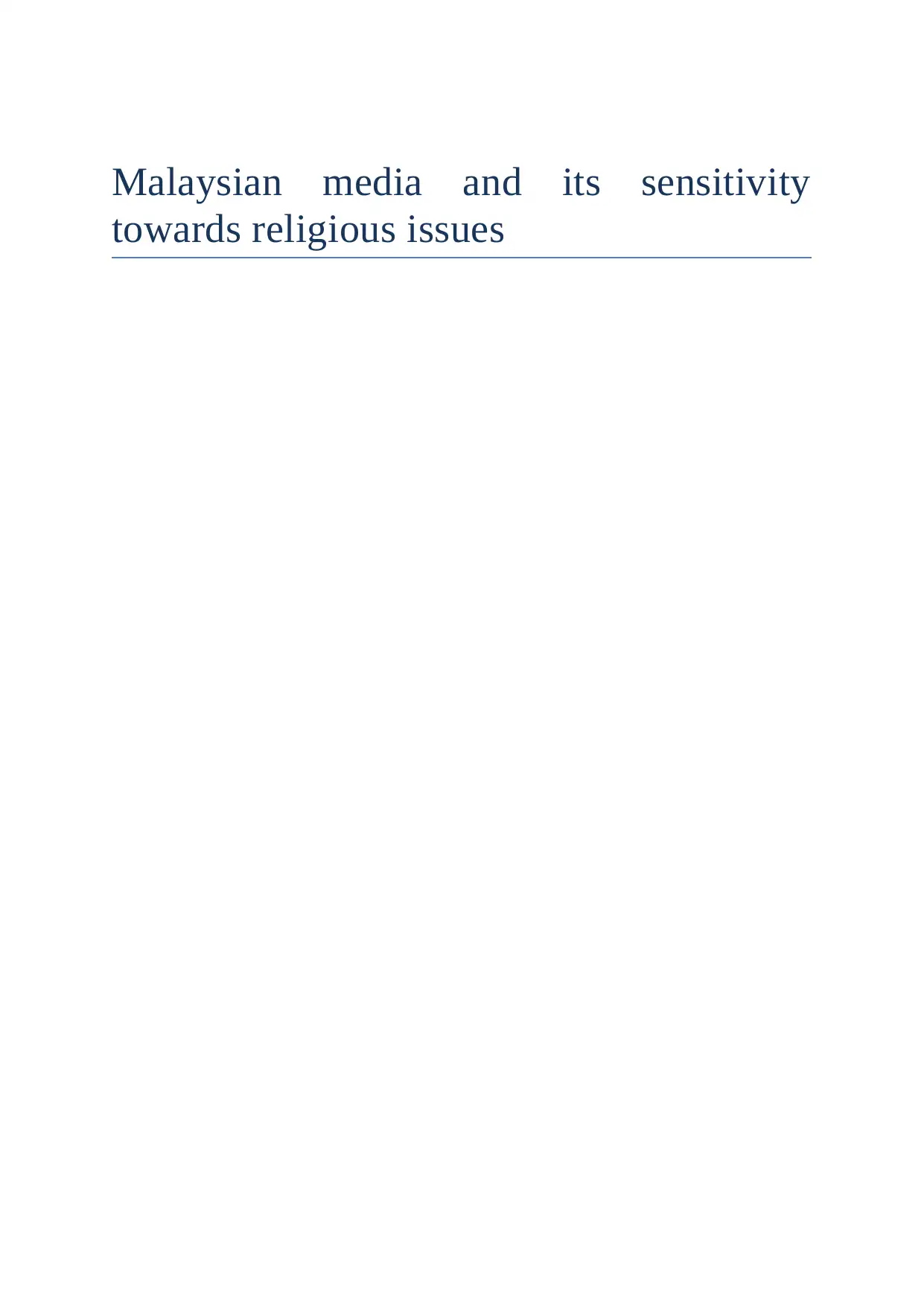
Malaysian media and its sensitivity
towards religious issues
towards religious issues
Secure Best Marks with AI Grader
Need help grading? Try our AI Grader for instant feedback on your assignments.
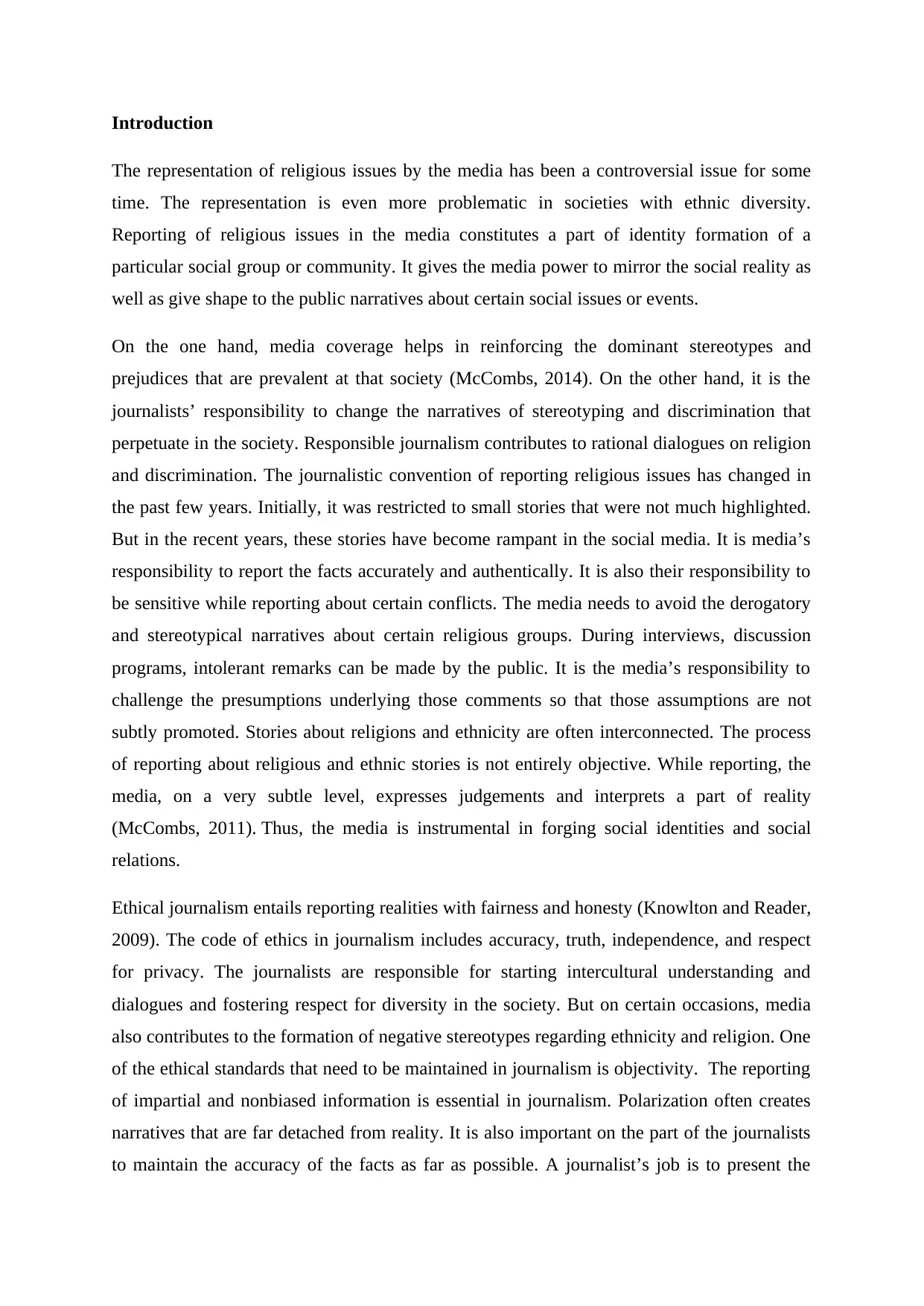
Introduction
The representation of religious issues by the media has been a controversial issue for some
time. The representation is even more problematic in societies with ethnic diversity.
Reporting of religious issues in the media constitutes a part of identity formation of a
particular social group or community. It gives the media power to mirror the social reality as
well as give shape to the public narratives about certain social issues or events.
On the one hand, media coverage helps in reinforcing the dominant stereotypes and
prejudices that are prevalent at that society (McCombs, 2014). On the other hand, it is the
journalists’ responsibility to change the narratives of stereotyping and discrimination that
perpetuate in the society. Responsible journalism contributes to rational dialogues on religion
and discrimination. The journalistic convention of reporting religious issues has changed in
the past few years. Initially, it was restricted to small stories that were not much highlighted.
But in the recent years, these stories have become rampant in the social media. It is media’s
responsibility to report the facts accurately and authentically. It is also their responsibility to
be sensitive while reporting about certain conflicts. The media needs to avoid the derogatory
and stereotypical narratives about certain religious groups. During interviews, discussion
programs, intolerant remarks can be made by the public. It is the media’s responsibility to
challenge the presumptions underlying those comments so that those assumptions are not
subtly promoted. Stories about religions and ethnicity are often interconnected. The process
of reporting about religious and ethnic stories is not entirely objective. While reporting, the
media, on a very subtle level, expresses judgements and interprets a part of reality
(McCombs, 2011). Thus, the media is instrumental in forging social identities and social
relations.
Ethical journalism entails reporting realities with fairness and honesty (Knowlton and Reader,
2009). The code of ethics in journalism includes accuracy, truth, independence, and respect
for privacy. The journalists are responsible for starting intercultural understanding and
dialogues and fostering respect for diversity in the society. But on certain occasions, media
also contributes to the formation of negative stereotypes regarding ethnicity and religion. One
of the ethical standards that need to be maintained in journalism is objectivity. The reporting
of impartial and nonbiased information is essential in journalism. Polarization often creates
narratives that are far detached from reality. It is also important on the part of the journalists
to maintain the accuracy of the facts as far as possible. A journalist’s job is to present the
The representation of religious issues by the media has been a controversial issue for some
time. The representation is even more problematic in societies with ethnic diversity.
Reporting of religious issues in the media constitutes a part of identity formation of a
particular social group or community. It gives the media power to mirror the social reality as
well as give shape to the public narratives about certain social issues or events.
On the one hand, media coverage helps in reinforcing the dominant stereotypes and
prejudices that are prevalent at that society (McCombs, 2014). On the other hand, it is the
journalists’ responsibility to change the narratives of stereotyping and discrimination that
perpetuate in the society. Responsible journalism contributes to rational dialogues on religion
and discrimination. The journalistic convention of reporting religious issues has changed in
the past few years. Initially, it was restricted to small stories that were not much highlighted.
But in the recent years, these stories have become rampant in the social media. It is media’s
responsibility to report the facts accurately and authentically. It is also their responsibility to
be sensitive while reporting about certain conflicts. The media needs to avoid the derogatory
and stereotypical narratives about certain religious groups. During interviews, discussion
programs, intolerant remarks can be made by the public. It is the media’s responsibility to
challenge the presumptions underlying those comments so that those assumptions are not
subtly promoted. Stories about religions and ethnicity are often interconnected. The process
of reporting about religious and ethnic stories is not entirely objective. While reporting, the
media, on a very subtle level, expresses judgements and interprets a part of reality
(McCombs, 2011). Thus, the media is instrumental in forging social identities and social
relations.
Ethical journalism entails reporting realities with fairness and honesty (Knowlton and Reader,
2009). The code of ethics in journalism includes accuracy, truth, independence, and respect
for privacy. The journalists are responsible for starting intercultural understanding and
dialogues and fostering respect for diversity in the society. But on certain occasions, media
also contributes to the formation of negative stereotypes regarding ethnicity and religion. One
of the ethical standards that need to be maintained in journalism is objectivity. The reporting
of impartial and nonbiased information is essential in journalism. Polarization often creates
narratives that are far detached from reality. It is also important on the part of the journalists
to maintain the accuracy of the facts as far as possible. A journalist’s job is to present the
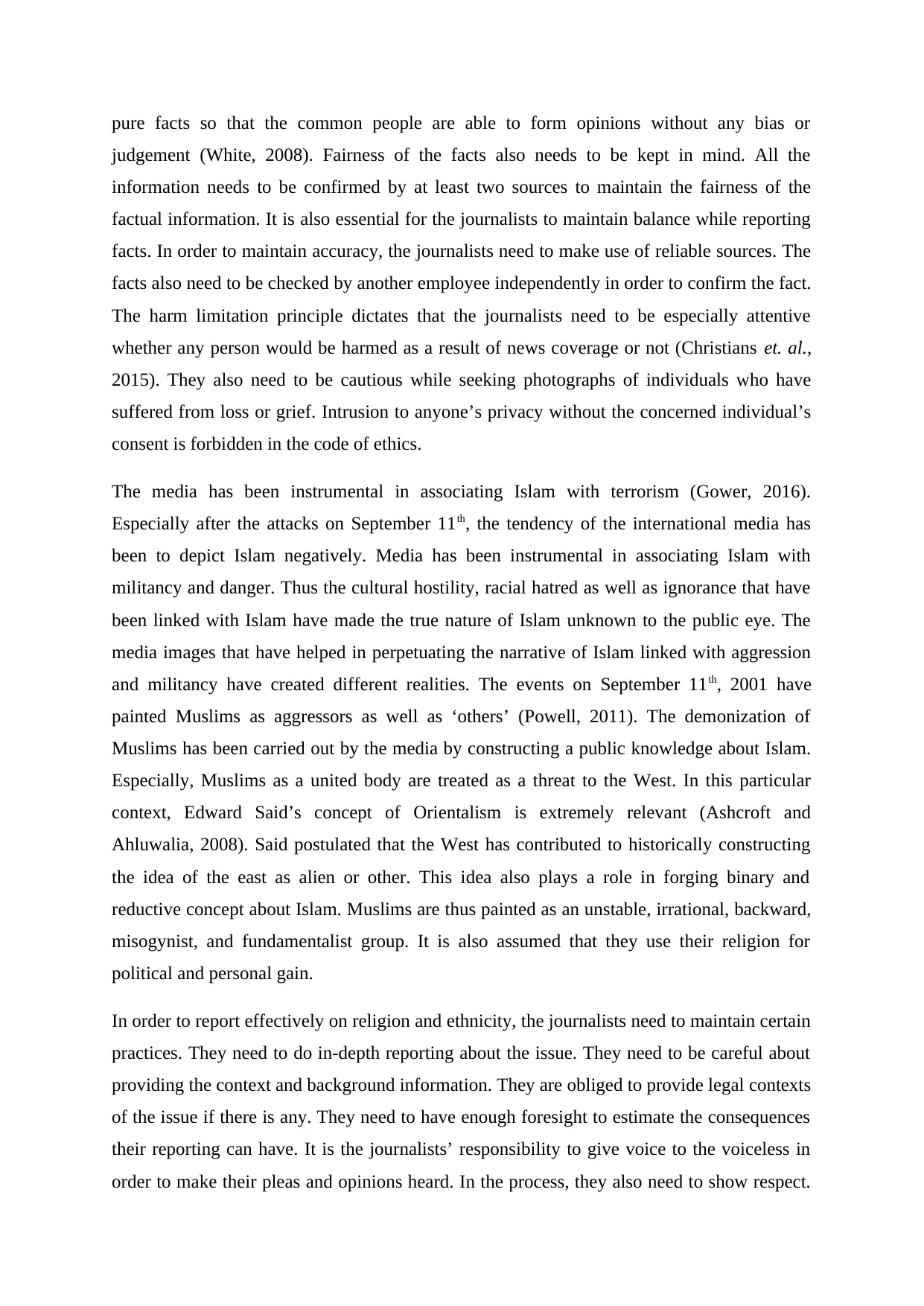
pure facts so that the common people are able to form opinions without any bias or
judgement (White, 2008). Fairness of the facts also needs to be kept in mind. All the
information needs to be confirmed by at least two sources to maintain the fairness of the
factual information. It is also essential for the journalists to maintain balance while reporting
facts. In order to maintain accuracy, the journalists need to make use of reliable sources. The
facts also need to be checked by another employee independently in order to confirm the fact.
The harm limitation principle dictates that the journalists need to be especially attentive
whether any person would be harmed as a result of news coverage or not (Christians et. al.,
2015). They also need to be cautious while seeking photographs of individuals who have
suffered from loss or grief. Intrusion to anyone’s privacy without the concerned individual’s
consent is forbidden in the code of ethics.
The media has been instrumental in associating Islam with terrorism (Gower, 2016).
Especially after the attacks on September 11th, the tendency of the international media has
been to depict Islam negatively. Media has been instrumental in associating Islam with
militancy and danger. Thus the cultural hostility, racial hatred as well as ignorance that have
been linked with Islam have made the true nature of Islam unknown to the public eye. The
media images that have helped in perpetuating the narrative of Islam linked with aggression
and militancy have created different realities. The events on September 11th, 2001 have
painted Muslims as aggressors as well as ‘others’ (Powell, 2011). The demonization of
Muslims has been carried out by the media by constructing a public knowledge about Islam.
Especially, Muslims as a united body are treated as a threat to the West. In this particular
context, Edward Said’s concept of Orientalism is extremely relevant (Ashcroft and
Ahluwalia, 2008). Said postulated that the West has contributed to historically constructing
the idea of the east as alien or other. This idea also plays a role in forging binary and
reductive concept about Islam. Muslims are thus painted as an unstable, irrational, backward,
misogynist, and fundamentalist group. It is also assumed that they use their religion for
political and personal gain.
In order to report effectively on religion and ethnicity, the journalists need to maintain certain
practices. They need to do in-depth reporting about the issue. They need to be careful about
providing the context and background information. They are obliged to provide legal contexts
of the issue if there is any. They need to have enough foresight to estimate the consequences
their reporting can have. It is the journalists’ responsibility to give voice to the voiceless in
order to make their pleas and opinions heard. In the process, they also need to show respect.
judgement (White, 2008). Fairness of the facts also needs to be kept in mind. All the
information needs to be confirmed by at least two sources to maintain the fairness of the
factual information. It is also essential for the journalists to maintain balance while reporting
facts. In order to maintain accuracy, the journalists need to make use of reliable sources. The
facts also need to be checked by another employee independently in order to confirm the fact.
The harm limitation principle dictates that the journalists need to be especially attentive
whether any person would be harmed as a result of news coverage or not (Christians et. al.,
2015). They also need to be cautious while seeking photographs of individuals who have
suffered from loss or grief. Intrusion to anyone’s privacy without the concerned individual’s
consent is forbidden in the code of ethics.
The media has been instrumental in associating Islam with terrorism (Gower, 2016).
Especially after the attacks on September 11th, the tendency of the international media has
been to depict Islam negatively. Media has been instrumental in associating Islam with
militancy and danger. Thus the cultural hostility, racial hatred as well as ignorance that have
been linked with Islam have made the true nature of Islam unknown to the public eye. The
media images that have helped in perpetuating the narrative of Islam linked with aggression
and militancy have created different realities. The events on September 11th, 2001 have
painted Muslims as aggressors as well as ‘others’ (Powell, 2011). The demonization of
Muslims has been carried out by the media by constructing a public knowledge about Islam.
Especially, Muslims as a united body are treated as a threat to the West. In this particular
context, Edward Said’s concept of Orientalism is extremely relevant (Ashcroft and
Ahluwalia, 2008). Said postulated that the West has contributed to historically constructing
the idea of the east as alien or other. This idea also plays a role in forging binary and
reductive concept about Islam. Muslims are thus painted as an unstable, irrational, backward,
misogynist, and fundamentalist group. It is also assumed that they use their religion for
political and personal gain.
In order to report effectively on religion and ethnicity, the journalists need to maintain certain
practices. They need to do in-depth reporting about the issue. They need to be careful about
providing the context and background information. They are obliged to provide legal contexts
of the issue if there is any. They need to have enough foresight to estimate the consequences
their reporting can have. It is the journalists’ responsibility to give voice to the voiceless in
order to make their pleas and opinions heard. In the process, they also need to show respect.
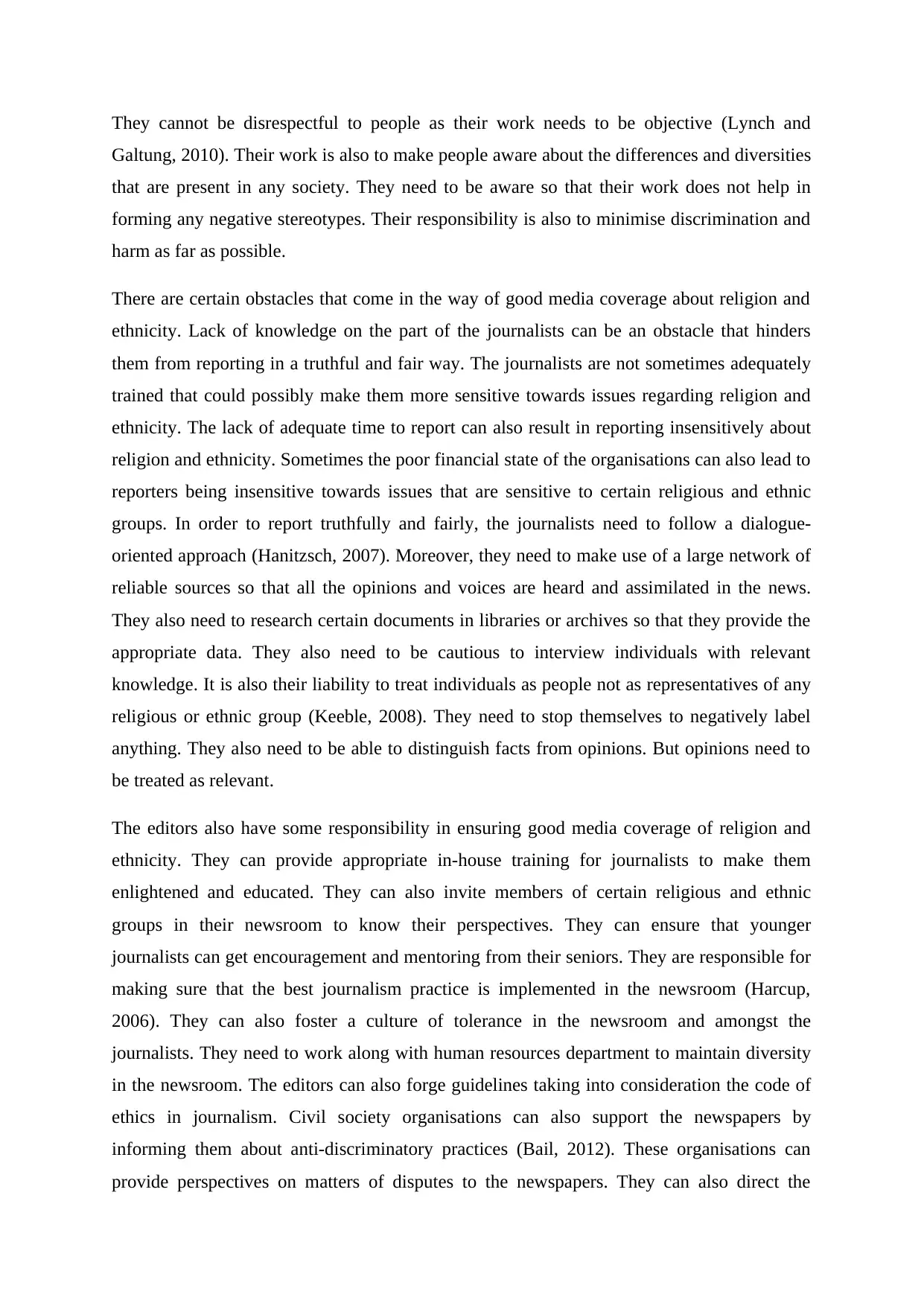
They cannot be disrespectful to people as their work needs to be objective (Lynch and
Galtung, 2010). Their work is also to make people aware about the differences and diversities
that are present in any society. They need to be aware so that their work does not help in
forming any negative stereotypes. Their responsibility is also to minimise discrimination and
harm as far as possible.
There are certain obstacles that come in the way of good media coverage about religion and
ethnicity. Lack of knowledge on the part of the journalists can be an obstacle that hinders
them from reporting in a truthful and fair way. The journalists are not sometimes adequately
trained that could possibly make them more sensitive towards issues regarding religion and
ethnicity. The lack of adequate time to report can also result in reporting insensitively about
religion and ethnicity. Sometimes the poor financial state of the organisations can also lead to
reporters being insensitive towards issues that are sensitive to certain religious and ethnic
groups. In order to report truthfully and fairly, the journalists need to follow a dialogue-
oriented approach (Hanitzsch, 2007). Moreover, they need to make use of a large network of
reliable sources so that all the opinions and voices are heard and assimilated in the news.
They also need to research certain documents in libraries or archives so that they provide the
appropriate data. They also need to be cautious to interview individuals with relevant
knowledge. It is also their liability to treat individuals as people not as representatives of any
religious or ethnic group (Keeble, 2008). They need to stop themselves to negatively label
anything. They also need to be able to distinguish facts from opinions. But opinions need to
be treated as relevant.
The editors also have some responsibility in ensuring good media coverage of religion and
ethnicity. They can provide appropriate in-house training for journalists to make them
enlightened and educated. They can also invite members of certain religious and ethnic
groups in their newsroom to know their perspectives. They can ensure that younger
journalists can get encouragement and mentoring from their seniors. They are responsible for
making sure that the best journalism practice is implemented in the newsroom (Harcup,
2006). They can also foster a culture of tolerance in the newsroom and amongst the
journalists. They need to work along with human resources department to maintain diversity
in the newsroom. The editors can also forge guidelines taking into consideration the code of
ethics in journalism. Civil society organisations can also support the newspapers by
informing them about anti-discriminatory practices (Bail, 2012). These organisations can
provide perspectives on matters of disputes to the newspapers. They can also direct the
Galtung, 2010). Their work is also to make people aware about the differences and diversities
that are present in any society. They need to be aware so that their work does not help in
forming any negative stereotypes. Their responsibility is also to minimise discrimination and
harm as far as possible.
There are certain obstacles that come in the way of good media coverage about religion and
ethnicity. Lack of knowledge on the part of the journalists can be an obstacle that hinders
them from reporting in a truthful and fair way. The journalists are not sometimes adequately
trained that could possibly make them more sensitive towards issues regarding religion and
ethnicity. The lack of adequate time to report can also result in reporting insensitively about
religion and ethnicity. Sometimes the poor financial state of the organisations can also lead to
reporters being insensitive towards issues that are sensitive to certain religious and ethnic
groups. In order to report truthfully and fairly, the journalists need to follow a dialogue-
oriented approach (Hanitzsch, 2007). Moreover, they need to make use of a large network of
reliable sources so that all the opinions and voices are heard and assimilated in the news.
They also need to research certain documents in libraries or archives so that they provide the
appropriate data. They also need to be cautious to interview individuals with relevant
knowledge. It is also their liability to treat individuals as people not as representatives of any
religious or ethnic group (Keeble, 2008). They need to stop themselves to negatively label
anything. They also need to be able to distinguish facts from opinions. But opinions need to
be treated as relevant.
The editors also have some responsibility in ensuring good media coverage of religion and
ethnicity. They can provide appropriate in-house training for journalists to make them
enlightened and educated. They can also invite members of certain religious and ethnic
groups in their newsroom to know their perspectives. They can ensure that younger
journalists can get encouragement and mentoring from their seniors. They are responsible for
making sure that the best journalism practice is implemented in the newsroom (Harcup,
2006). They can also foster a culture of tolerance in the newsroom and amongst the
journalists. They need to work along with human resources department to maintain diversity
in the newsroom. The editors can also forge guidelines taking into consideration the code of
ethics in journalism. Civil society organisations can also support the newspapers by
informing them about anti-discriminatory practices (Bail, 2012). These organisations can
provide perspectives on matters of disputes to the newspapers. They can also direct the
Secure Best Marks with AI Grader
Need help grading? Try our AI Grader for instant feedback on your assignments.
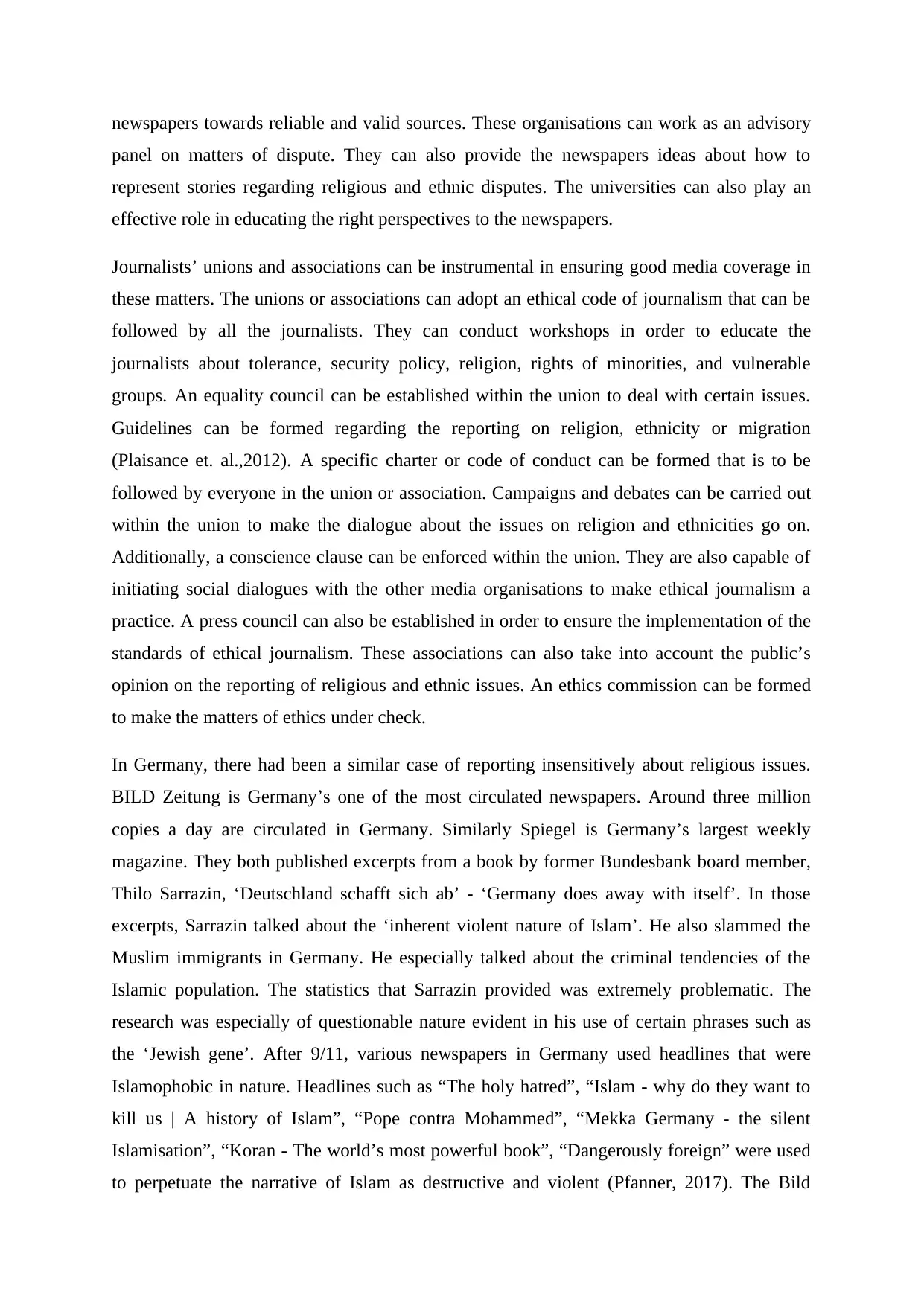
newspapers towards reliable and valid sources. These organisations can work as an advisory
panel on matters of dispute. They can also provide the newspapers ideas about how to
represent stories regarding religious and ethnic disputes. The universities can also play an
effective role in educating the right perspectives to the newspapers.
Journalists’ unions and associations can be instrumental in ensuring good media coverage in
these matters. The unions or associations can adopt an ethical code of journalism that can be
followed by all the journalists. They can conduct workshops in order to educate the
journalists about tolerance, security policy, religion, rights of minorities, and vulnerable
groups. An equality council can be established within the union to deal with certain issues.
Guidelines can be formed regarding the reporting on religion, ethnicity or migration
(Plaisance et. al.,2012). A specific charter or code of conduct can be formed that is to be
followed by everyone in the union or association. Campaigns and debates can be carried out
within the union to make the dialogue about the issues on religion and ethnicities go on.
Additionally, a conscience clause can be enforced within the union. They are also capable of
initiating social dialogues with the other media organisations to make ethical journalism a
practice. A press council can also be established in order to ensure the implementation of the
standards of ethical journalism. These associations can also take into account the public’s
opinion on the reporting of religious and ethnic issues. An ethics commission can be formed
to make the matters of ethics under check.
In Germany, there had been a similar case of reporting insensitively about religious issues.
BILD Zeitung is Germany’s one of the most circulated newspapers. Around three million
copies a day are circulated in Germany. Similarly Spiegel is Germany’s largest weekly
magazine. They both published excerpts from a book by former Bundesbank board member,
Thilo Sarrazin, ‘Deutschland schafft sich ab’ - ‘Germany does away with itself’. In those
excerpts, Sarrazin talked about the ‘inherent violent nature of Islam’. He also slammed the
Muslim immigrants in Germany. He especially talked about the criminal tendencies of the
Islamic population. The statistics that Sarrazin provided was extremely problematic. The
research was especially of questionable nature evident in his use of certain phrases such as
the ‘Jewish gene’. After 9/11, various newspapers in Germany used headlines that were
Islamophobic in nature. Headlines such as “The holy hatred”, “Islam - why do they want to
kill us | A history of Islam”, “Pope contra Mohammed”, “Mekka Germany - the silent
Islamisation”, “Koran - The world’s most powerful book”, “Dangerously foreign” were used
to perpetuate the narrative of Islam as destructive and violent (Pfanner, 2017). The Bild
panel on matters of dispute. They can also provide the newspapers ideas about how to
represent stories regarding religious and ethnic disputes. The universities can also play an
effective role in educating the right perspectives to the newspapers.
Journalists’ unions and associations can be instrumental in ensuring good media coverage in
these matters. The unions or associations can adopt an ethical code of journalism that can be
followed by all the journalists. They can conduct workshops in order to educate the
journalists about tolerance, security policy, religion, rights of minorities, and vulnerable
groups. An equality council can be established within the union to deal with certain issues.
Guidelines can be formed regarding the reporting on religion, ethnicity or migration
(Plaisance et. al.,2012). A specific charter or code of conduct can be formed that is to be
followed by everyone in the union or association. Campaigns and debates can be carried out
within the union to make the dialogue about the issues on religion and ethnicities go on.
Additionally, a conscience clause can be enforced within the union. They are also capable of
initiating social dialogues with the other media organisations to make ethical journalism a
practice. A press council can also be established in order to ensure the implementation of the
standards of ethical journalism. These associations can also take into account the public’s
opinion on the reporting of religious and ethnic issues. An ethics commission can be formed
to make the matters of ethics under check.
In Germany, there had been a similar case of reporting insensitively about religious issues.
BILD Zeitung is Germany’s one of the most circulated newspapers. Around three million
copies a day are circulated in Germany. Similarly Spiegel is Germany’s largest weekly
magazine. They both published excerpts from a book by former Bundesbank board member,
Thilo Sarrazin, ‘Deutschland schafft sich ab’ - ‘Germany does away with itself’. In those
excerpts, Sarrazin talked about the ‘inherent violent nature of Islam’. He also slammed the
Muslim immigrants in Germany. He especially talked about the criminal tendencies of the
Islamic population. The statistics that Sarrazin provided was extremely problematic. The
research was especially of questionable nature evident in his use of certain phrases such as
the ‘Jewish gene’. After 9/11, various newspapers in Germany used headlines that were
Islamophobic in nature. Headlines such as “The holy hatred”, “Islam - why do they want to
kill us | A history of Islam”, “Pope contra Mohammed”, “Mekka Germany - the silent
Islamisation”, “Koran - The world’s most powerful book”, “Dangerously foreign” were used
to perpetuate the narrative of Islam as destructive and violent (Pfanner, 2017). The Bild
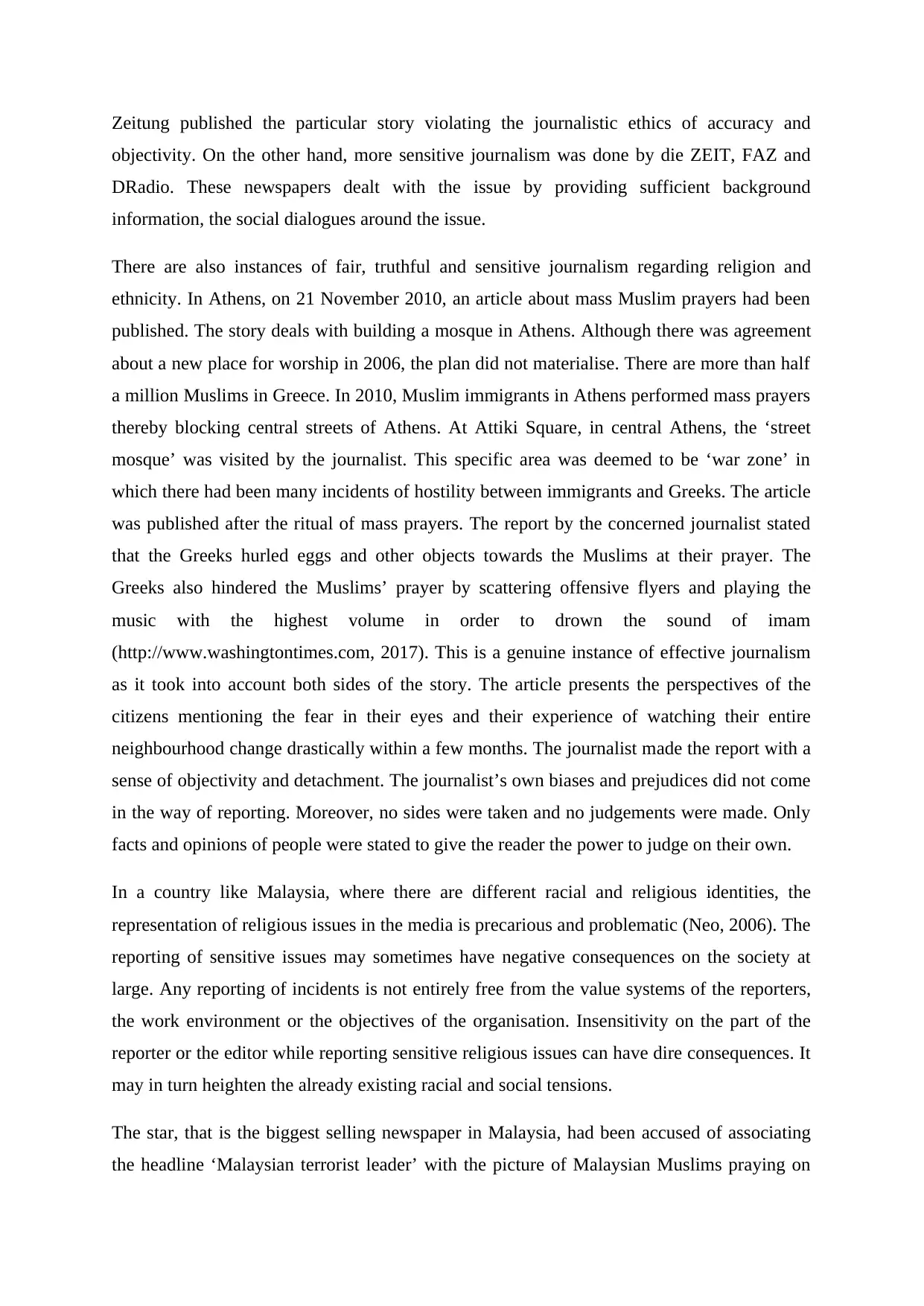
Zeitung published the particular story violating the journalistic ethics of accuracy and
objectivity. On the other hand, more sensitive journalism was done by die ZEIT, FAZ and
DRadio. These newspapers dealt with the issue by providing sufficient background
information, the social dialogues around the issue.
There are also instances of fair, truthful and sensitive journalism regarding religion and
ethnicity. In Athens, on 21 November 2010, an article about mass Muslim prayers had been
published. The story deals with building a mosque in Athens. Although there was agreement
about a new place for worship in 2006, the plan did not materialise. There are more than half
a million Muslims in Greece. In 2010, Muslim immigrants in Athens performed mass prayers
thereby blocking central streets of Athens. At Attiki Square, in central Athens, the ‘street
mosque’ was visited by the journalist. This specific area was deemed to be ‘war zone’ in
which there had been many incidents of hostility between immigrants and Greeks. The article
was published after the ritual of mass prayers. The report by the concerned journalist stated
that the Greeks hurled eggs and other objects towards the Muslims at their prayer. The
Greeks also hindered the Muslims’ prayer by scattering offensive flyers and playing the
music with the highest volume in order to drown the sound of imam
(http://www.washingtontimes.com, 2017). This is a genuine instance of effective journalism
as it took into account both sides of the story. The article presents the perspectives of the
citizens mentioning the fear in their eyes and their experience of watching their entire
neighbourhood change drastically within a few months. The journalist made the report with a
sense of objectivity and detachment. The journalist’s own biases and prejudices did not come
in the way of reporting. Moreover, no sides were taken and no judgements were made. Only
facts and opinions of people were stated to give the reader the power to judge on their own.
In a country like Malaysia, where there are different racial and religious identities, the
representation of religious issues in the media is precarious and problematic (Neo, 2006). The
reporting of sensitive issues may sometimes have negative consequences on the society at
large. Any reporting of incidents is not entirely free from the value systems of the reporters,
the work environment or the objectives of the organisation. Insensitivity on the part of the
reporter or the editor while reporting sensitive religious issues can have dire consequences. It
may in turn heighten the already existing racial and social tensions.
The star, that is the biggest selling newspaper in Malaysia, had been accused of associating
the headline ‘Malaysian terrorist leader’ with the picture of Malaysian Muslims praying on
objectivity. On the other hand, more sensitive journalism was done by die ZEIT, FAZ and
DRadio. These newspapers dealt with the issue by providing sufficient background
information, the social dialogues around the issue.
There are also instances of fair, truthful and sensitive journalism regarding religion and
ethnicity. In Athens, on 21 November 2010, an article about mass Muslim prayers had been
published. The story deals with building a mosque in Athens. Although there was agreement
about a new place for worship in 2006, the plan did not materialise. There are more than half
a million Muslims in Greece. In 2010, Muslim immigrants in Athens performed mass prayers
thereby blocking central streets of Athens. At Attiki Square, in central Athens, the ‘street
mosque’ was visited by the journalist. This specific area was deemed to be ‘war zone’ in
which there had been many incidents of hostility between immigrants and Greeks. The article
was published after the ritual of mass prayers. The report by the concerned journalist stated
that the Greeks hurled eggs and other objects towards the Muslims at their prayer. The
Greeks also hindered the Muslims’ prayer by scattering offensive flyers and playing the
music with the highest volume in order to drown the sound of imam
(http://www.washingtontimes.com, 2017). This is a genuine instance of effective journalism
as it took into account both sides of the story. The article presents the perspectives of the
citizens mentioning the fear in their eyes and their experience of watching their entire
neighbourhood change drastically within a few months. The journalist made the report with a
sense of objectivity and detachment. The journalist’s own biases and prejudices did not come
in the way of reporting. Moreover, no sides were taken and no judgements were made. Only
facts and opinions of people were stated to give the reader the power to judge on their own.
In a country like Malaysia, where there are different racial and religious identities, the
representation of religious issues in the media is precarious and problematic (Neo, 2006). The
reporting of sensitive issues may sometimes have negative consequences on the society at
large. Any reporting of incidents is not entirely free from the value systems of the reporters,
the work environment or the objectives of the organisation. Insensitivity on the part of the
reporter or the editor while reporting sensitive religious issues can have dire consequences. It
may in turn heighten the already existing racial and social tensions.
The star, that is the biggest selling newspaper in Malaysia, had been accused of associating
the headline ‘Malaysian terrorist leader’ with the picture of Malaysian Muslims praying on
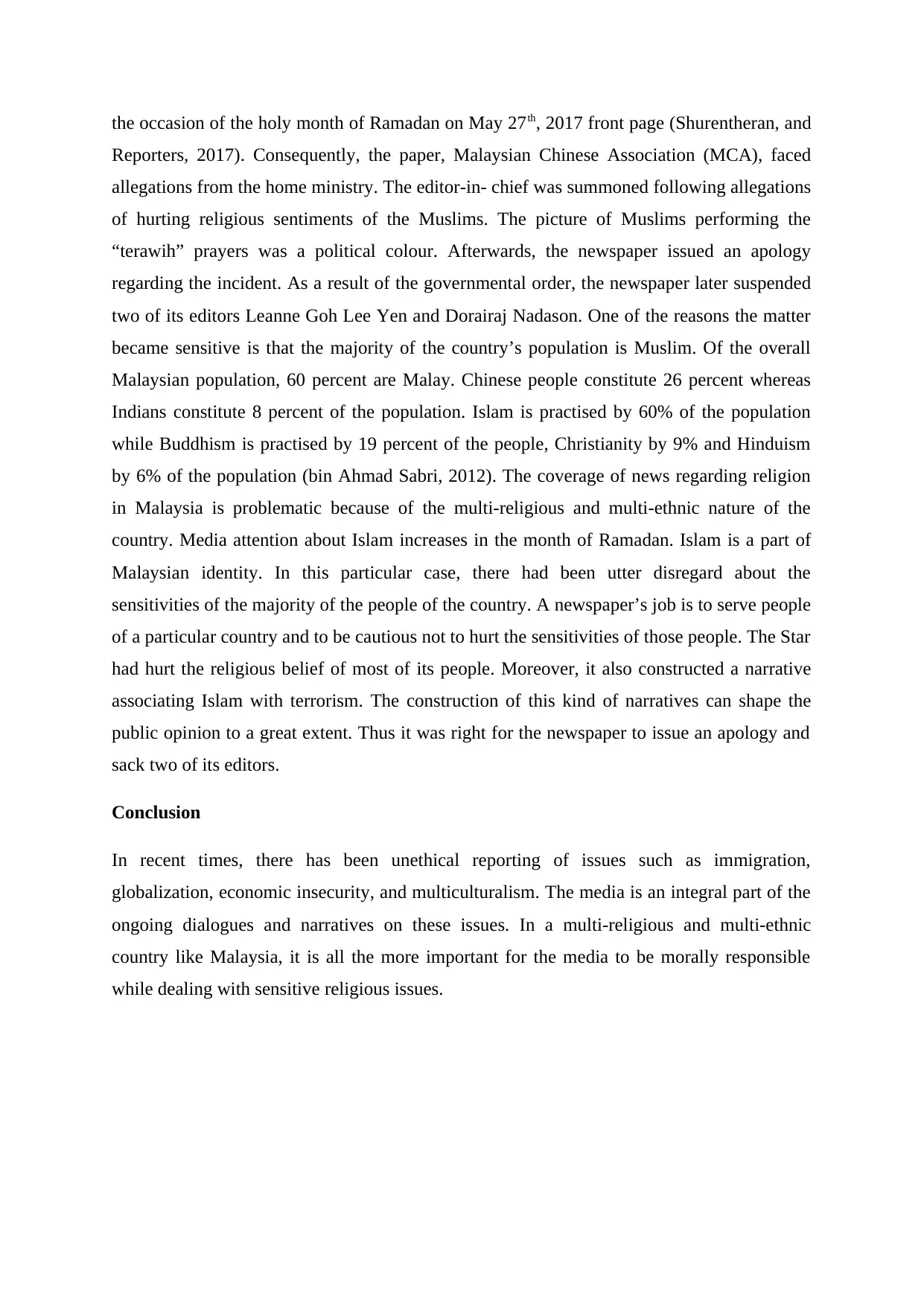
the occasion of the holy month of Ramadan on May 27th, 2017 front page (Shurentheran, and
Reporters, 2017). Consequently, the paper, Malaysian Chinese Association (MCA), faced
allegations from the home ministry. The editor-in- chief was summoned following allegations
of hurting religious sentiments of the Muslims. The picture of Muslims performing the
“terawih” prayers was a political colour. Afterwards, the newspaper issued an apology
regarding the incident. As a result of the governmental order, the newspaper later suspended
two of its editors Leanne Goh Lee Yen and Dorairaj Nadason. One of the reasons the matter
became sensitive is that the majority of the country’s population is Muslim. Of the overall
Malaysian population, 60 percent are Malay. Chinese people constitute 26 percent whereas
Indians constitute 8 percent of the population. Islam is practised by 60% of the population
while Buddhism is practised by 19 percent of the people, Christianity by 9% and Hinduism
by 6% of the population (bin Ahmad Sabri, 2012). The coverage of news regarding religion
in Malaysia is problematic because of the multi-religious and multi-ethnic nature of the
country. Media attention about Islam increases in the month of Ramadan. Islam is a part of
Malaysian identity. In this particular case, there had been utter disregard about the
sensitivities of the majority of the people of the country. A newspaper’s job is to serve people
of a particular country and to be cautious not to hurt the sensitivities of those people. The Star
had hurt the religious belief of most of its people. Moreover, it also constructed a narrative
associating Islam with terrorism. The construction of this kind of narratives can shape the
public opinion to a great extent. Thus it was right for the newspaper to issue an apology and
sack two of its editors.
Conclusion
In recent times, there has been unethical reporting of issues such as immigration,
globalization, economic insecurity, and multiculturalism. The media is an integral part of the
ongoing dialogues and narratives on these issues. In a multi-religious and multi-ethnic
country like Malaysia, it is all the more important for the media to be morally responsible
while dealing with sensitive religious issues.
Reporters, 2017). Consequently, the paper, Malaysian Chinese Association (MCA), faced
allegations from the home ministry. The editor-in- chief was summoned following allegations
of hurting religious sentiments of the Muslims. The picture of Muslims performing the
“terawih” prayers was a political colour. Afterwards, the newspaper issued an apology
regarding the incident. As a result of the governmental order, the newspaper later suspended
two of its editors Leanne Goh Lee Yen and Dorairaj Nadason. One of the reasons the matter
became sensitive is that the majority of the country’s population is Muslim. Of the overall
Malaysian population, 60 percent are Malay. Chinese people constitute 26 percent whereas
Indians constitute 8 percent of the population. Islam is practised by 60% of the population
while Buddhism is practised by 19 percent of the people, Christianity by 9% and Hinduism
by 6% of the population (bin Ahmad Sabri, 2012). The coverage of news regarding religion
in Malaysia is problematic because of the multi-religious and multi-ethnic nature of the
country. Media attention about Islam increases in the month of Ramadan. Islam is a part of
Malaysian identity. In this particular case, there had been utter disregard about the
sensitivities of the majority of the people of the country. A newspaper’s job is to serve people
of a particular country and to be cautious not to hurt the sensitivities of those people. The Star
had hurt the religious belief of most of its people. Moreover, it also constructed a narrative
associating Islam with terrorism. The construction of this kind of narratives can shape the
public opinion to a great extent. Thus it was right for the newspaper to issue an apology and
sack two of its editors.
Conclusion
In recent times, there has been unethical reporting of issues such as immigration,
globalization, economic insecurity, and multiculturalism. The media is an integral part of the
ongoing dialogues and narratives on these issues. In a multi-religious and multi-ethnic
country like Malaysia, it is all the more important for the media to be morally responsible
while dealing with sensitive religious issues.
Paraphrase This Document
Need a fresh take? Get an instant paraphrase of this document with our AI Paraphraser
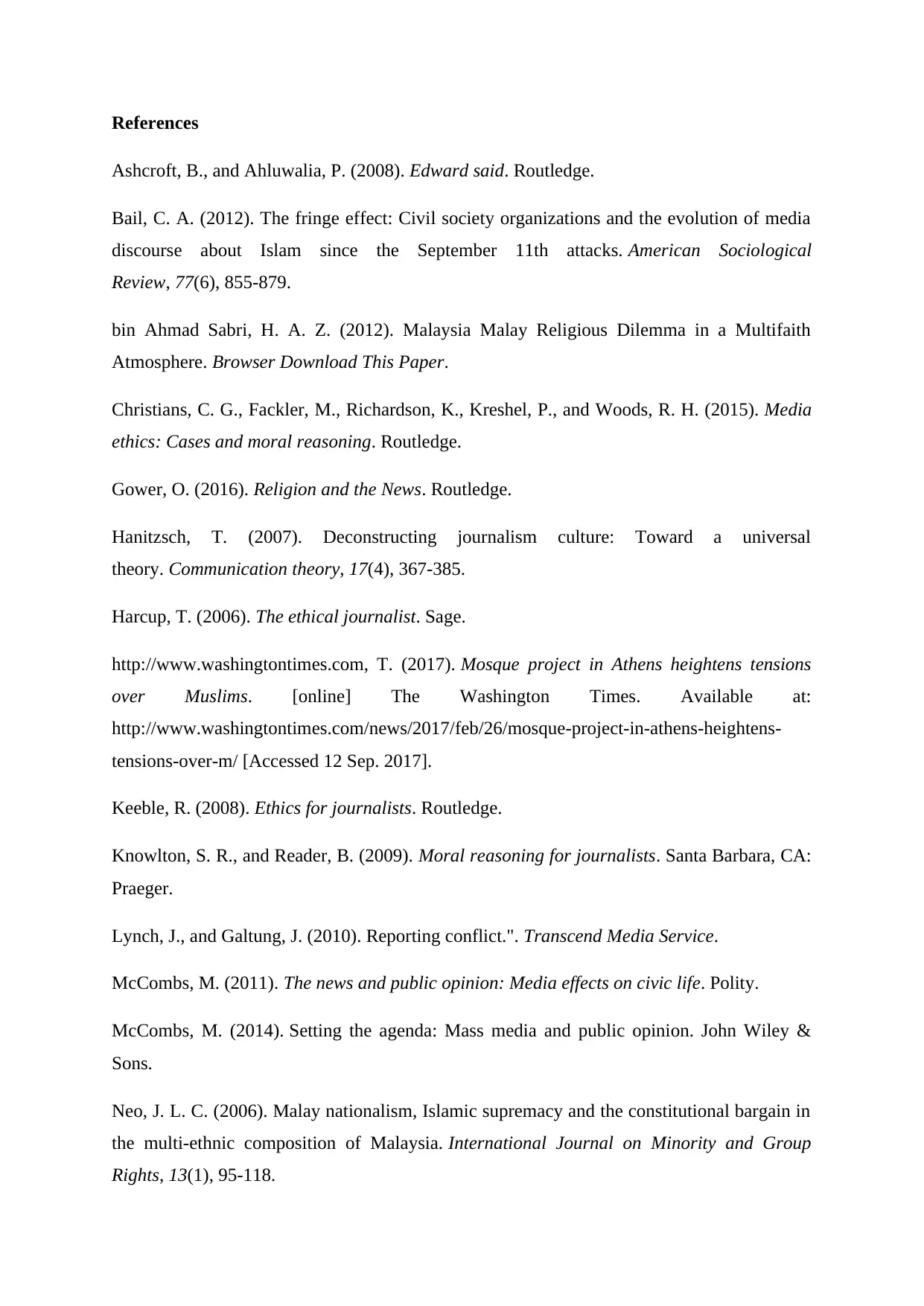
References
Ashcroft, B., and Ahluwalia, P. (2008). Edward said. Routledge.
Bail, C. A. (2012). The fringe effect: Civil society organizations and the evolution of media
discourse about Islam since the September 11th attacks. American Sociological
Review, 77(6), 855-879.
bin Ahmad Sabri, H. A. Z. (2012). Malaysia Malay Religious Dilemma in a Multifaith
Atmosphere. Browser Download This Paper.
Christians, C. G., Fackler, M., Richardson, K., Kreshel, P., and Woods, R. H. (2015). Media
ethics: Cases and moral reasoning. Routledge.
Gower, O. (2016). Religion and the News. Routledge.
Hanitzsch, T. (2007). Deconstructing journalism culture: Toward a universal
theory. Communication theory, 17(4), 367-385.
Harcup, T. (2006). The ethical journalist. Sage.
http://www.washingtontimes.com, T. (2017). Mosque project in Athens heightens tensions
over Muslims. [online] The Washington Times. Available at:
http://www.washingtontimes.com/news/2017/feb/26/mosque-project-in-athens-heightens-
tensions-over-m/ [Accessed 12 Sep. 2017].
Keeble, R. (2008). Ethics for journalists. Routledge.
Knowlton, S. R., and Reader, B. (2009). Moral reasoning for journalists. Santa Barbara, CA:
Praeger.
Lynch, J., and Galtung, J. (2010). Reporting conflict.". Transcend Media Service.
McCombs, M. (2011). The news and public opinion: Media effects on civic life. Polity.
McCombs, M. (2014). Setting the agenda: Mass media and public opinion. John Wiley &
Sons.
Neo, J. L. C. (2006). Malay nationalism, Islamic supremacy and the constitutional bargain in
the multi-ethnic composition of Malaysia. International Journal on Minority and Group
Rights, 13(1), 95-118.
Ashcroft, B., and Ahluwalia, P. (2008). Edward said. Routledge.
Bail, C. A. (2012). The fringe effect: Civil society organizations and the evolution of media
discourse about Islam since the September 11th attacks. American Sociological
Review, 77(6), 855-879.
bin Ahmad Sabri, H. A. Z. (2012). Malaysia Malay Religious Dilemma in a Multifaith
Atmosphere. Browser Download This Paper.
Christians, C. G., Fackler, M., Richardson, K., Kreshel, P., and Woods, R. H. (2015). Media
ethics: Cases and moral reasoning. Routledge.
Gower, O. (2016). Religion and the News. Routledge.
Hanitzsch, T. (2007). Deconstructing journalism culture: Toward a universal
theory. Communication theory, 17(4), 367-385.
Harcup, T. (2006). The ethical journalist. Sage.
http://www.washingtontimes.com, T. (2017). Mosque project in Athens heightens tensions
over Muslims. [online] The Washington Times. Available at:
http://www.washingtontimes.com/news/2017/feb/26/mosque-project-in-athens-heightens-
tensions-over-m/ [Accessed 12 Sep. 2017].
Keeble, R. (2008). Ethics for journalists. Routledge.
Knowlton, S. R., and Reader, B. (2009). Moral reasoning for journalists. Santa Barbara, CA:
Praeger.
Lynch, J., and Galtung, J. (2010). Reporting conflict.". Transcend Media Service.
McCombs, M. (2011). The news and public opinion: Media effects on civic life. Polity.
McCombs, M. (2014). Setting the agenda: Mass media and public opinion. John Wiley &
Sons.
Neo, J. L. C. (2006). Malay nationalism, Islamic supremacy and the constitutional bargain in
the multi-ethnic composition of Malaysia. International Journal on Minority and Group
Rights, 13(1), 95-118.
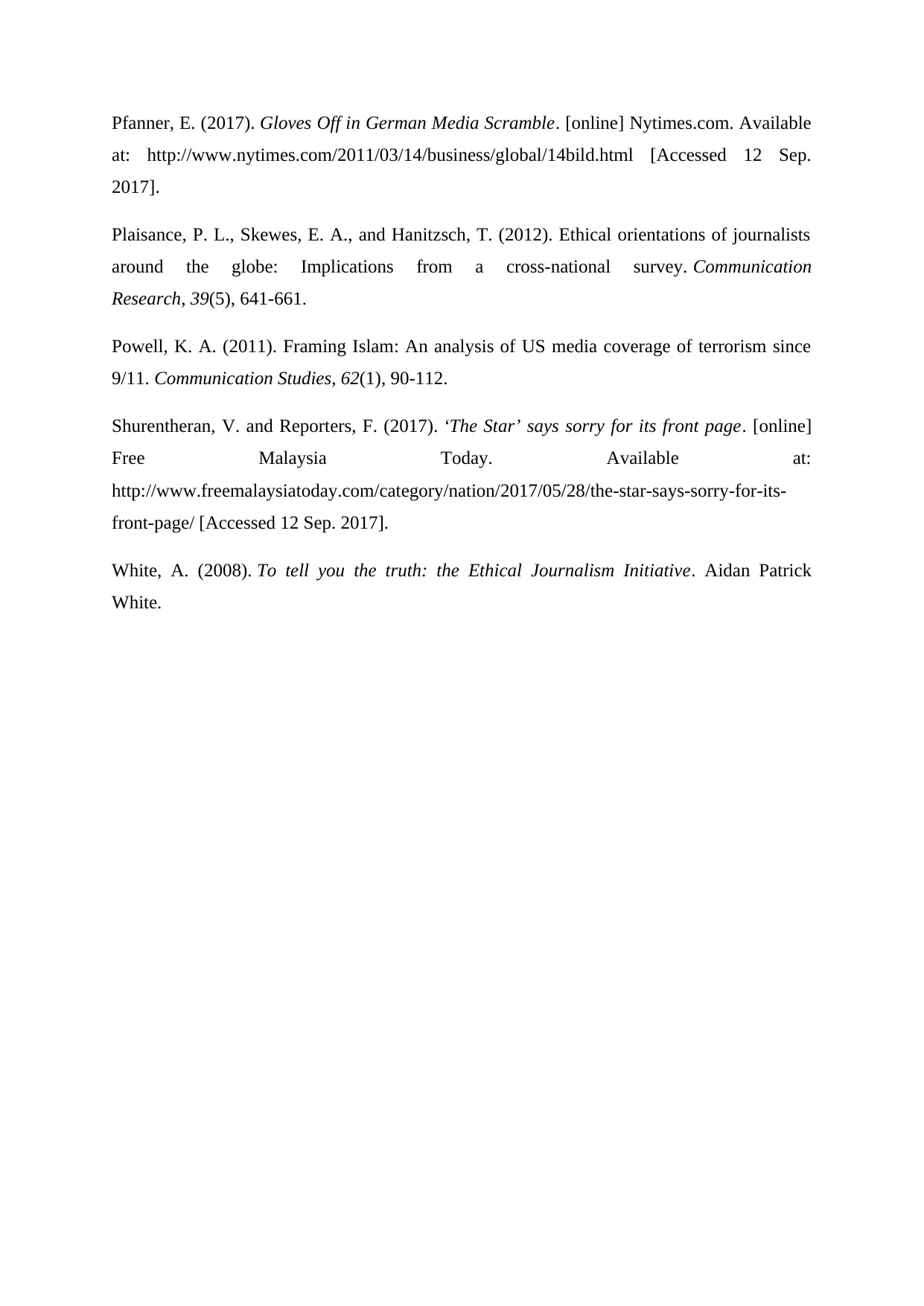
Pfanner, E. (2017). Gloves Off in German Media Scramble. [online] Nytimes.com. Available
at: http://www.nytimes.com/2011/03/14/business/global/14bild.html [Accessed 12 Sep.
2017].
Plaisance, P. L., Skewes, E. A., and Hanitzsch, T. (2012). Ethical orientations of journalists
around the globe: Implications from a cross-national survey. Communication
Research, 39(5), 641-661.
Powell, K. A. (2011). Framing Islam: An analysis of US media coverage of terrorism since
9/11. Communication Studies, 62(1), 90-112.
Shurentheran, V. and Reporters, F. (2017). ‘The Star’ says sorry for its front page. [online]
Free Malaysia Today. Available at:
http://www.freemalaysiatoday.com/category/nation/2017/05/28/the-star-says-sorry-for-its-
front-page/ [Accessed 12 Sep. 2017].
White, A. (2008). To tell you the truth: the Ethical Journalism Initiative. Aidan Patrick
White.
at: http://www.nytimes.com/2011/03/14/business/global/14bild.html [Accessed 12 Sep.
2017].
Plaisance, P. L., Skewes, E. A., and Hanitzsch, T. (2012). Ethical orientations of journalists
around the globe: Implications from a cross-national survey. Communication
Research, 39(5), 641-661.
Powell, K. A. (2011). Framing Islam: An analysis of US media coverage of terrorism since
9/11. Communication Studies, 62(1), 90-112.
Shurentheran, V. and Reporters, F. (2017). ‘The Star’ says sorry for its front page. [online]
Free Malaysia Today. Available at:
http://www.freemalaysiatoday.com/category/nation/2017/05/28/the-star-says-sorry-for-its-
front-page/ [Accessed 12 Sep. 2017].
White, A. (2008). To tell you the truth: the Ethical Journalism Initiative. Aidan Patrick
White.
1 out of 9
Your All-in-One AI-Powered Toolkit for Academic Success.
+13062052269
info@desklib.com
Available 24*7 on WhatsApp / Email
![[object Object]](/_next/static/media/star-bottom.7253800d.svg)
Unlock your academic potential
© 2024 | Zucol Services PVT LTD | All rights reserved.